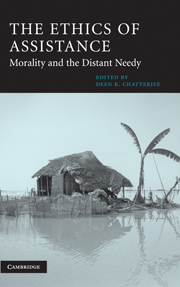Book contents
- Frontmatter
- Contents
- Notes on contributors
- Preface
- 1 Introduction
- PART I THE ETHICS OF DISTANCE
- PART II COMMUNITIES AND OBLIGATIONS
- 6 Moral closeness and world community
- 7 National responsibility and international justice
- PART III THE LAW OF PEOPLES
- PART IV RIGHTS, RESPONSIBILITIES AND INSTITUTIONAL REFORMS
- Index
6 - Moral closeness and world community
Published online by Cambridge University Press: 05 June 2012
- Frontmatter
- Contents
- Notes on contributors
- Preface
- 1 Introduction
- PART I THE ETHICS OF DISTANCE
- PART II COMMUNITIES AND OBLIGATIONS
- 6 Moral closeness and world community
- 7 National responsibility and international justice
- PART III THE LAW OF PEOPLES
- PART IV RIGHTS, RESPONSIBILITIES AND INSTITUTIONAL REFORMS
- Index
Summary
Ordinary moral thinking about aid to needy strangers discriminates in favor of the political closeness of compatriots and the literal closeness of people in peril who are close at hand. For example, in ordinary moral thinking, I have, as an American citizen, a much more demanding duty to support tax-financed aid to the poor of the United States than to support such aid to the foreign poor. I have a duty to save a drowning toddler I encounter at the cost of ruining my four-hundred-dollar suit, but not a duty to donate four hundred dollars to save children in a distant village from a yet more ghastly death from dysentery.
One of my goals is to defend these biases, showing that they express a deep commitment to moral equality. The other is to show that a proper understanding of their justification establishes substantial, if less demanding duties to help the foreign poor. In this way, a vindication of ordinary moral favoritism toward closeness grounds a case for extensive foreign aid that could be believable to the vast majority of non-philosophers, who find it unbelievable that a strong duty of impartial concern for neediness, whether near or far, determines what should be done to help needy strangers.
A MORALITY OF EQUAL RESPECT
My framework for defending this favoritism is a cluster of interconnected moral judgments that provide a partial interpretation of the principle that a choice is wrong just in case it could not express appreciation of the equal worth of all.
- Type
- Chapter
- Information
- The Ethics of AssistanceMorality and the Distant Needy, pp. 101 - 122Publisher: Cambridge University PressPrint publication year: 2004
- 6
- Cited by

